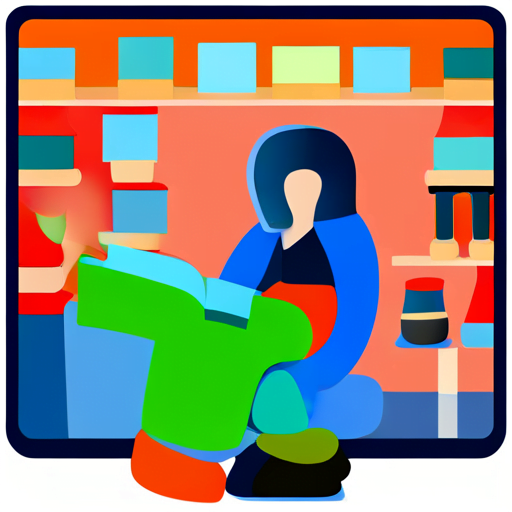Are you struggling to find a hobby that you truly enjoy? Look no further than reading! Not only is it a great way to escape reality and de-stress, but it also has numerous benefits for your mental health and cognitive function.
However, if you’re not already an avid reader, it can be daunting to know where to start and how to make reading a habit.
That’s why we’ve put together this guide, ‘From Zero to Hero: How to Turn Reading Into an Enjoyable Hobby.’ We’ll cover how to choose the right books for you, make time for reading, and provide tips for truly enjoying the reading experience.
With a little effort and dedication, you’ll soon be able to transform yourself from a non-reader to a book-loving hero.
Table of Contents
The Benefits of Reading

You’ll discover that reading is like opening a window to a world full of knowledge, imagination, and personal growth.
The benefits of reading are countless and can positively impact your life in many ways.
Firstly, reading is an excellent way to expand your vocabulary and improve your language skills. You’ll come across new words and different writing styles that can help you improve your communication skills and express yourself more eloquently.
Moreover, reading can help you expand your knowledge and broaden your perspective on different topics. Whether it’s fiction or non-fiction, reading can teach you new things, show you different perspectives, and help you learn about different cultures and lifestyles.
Reading can also help you improve your cognitive skills, including your concentration, focus, and memory. It’s like a workout for your brain that can improve your mental agility and keep your mind sharp.
How to Choose the Right Books for You

So, you want to start reading more but don’t know where to begin? The first step is to identify your interests and preferences.
This will help you narrow down the types of books that you’ll enjoy.
Next, do some research on recommended books and authors that align with your interests.
Finally, don’t be afraid to experiment with different genres to find what really resonates with you.
By following these simple steps, you’ll be on your way to building a reading list that you’ll love.
Identify Your Interests and Preferences
Consider what makes you curious or excited, what kind of stories or characters you tend to relate to or empathize with, and what kind of writing style or tone resonates with you.
Once you have a better idea of your literary tastes, explore different authors and titles within those categories. Don’t be afraid to branch out and try something new, but also don’t feel pressured to read books that don’t interest you just because they’re popular or acclaimed.
Remember that reading is supposed to be enjoyable, not a chore or a competition. By finding books that speak to your passions and preferences, you can turn reading into a pleasurable and enriching hobby that you look forward to every day.
Research Recommended Books and Authors
The internet is a vast resource for finding recommendations, with websites like Goodreads and Amazon providing personalized recommendations based on your past reading history. You can also join online book clubs or forums to connect with like-minded readers and receive suggestions for books to add to your reading list.
When researching recommended books and authors, it’s important to read reviews and synopses to determine if they align with your interests and preferences. Don’t be afraid to step out of your comfort zone and try something new, but also don’t feel obligated to read something just because it’s highly recommended.
Remember, reading should be enjoyable and fulfilling, so choose books that you’re excited to read and that will enhance your reading experience.
Experiment with Different Genres
Stepping outside of your comfort zone and exploring different genres is an excellent way to challenge yourself as a reader. It’ll also help you discover new stories and authors that you may have never encountered before.
If you typically gravitate towards romance novels, why not try a thriller or a mystery? And if you love science fiction, why not give historical fiction a chance? Don’t be afraid to experiment with different genres and see what resonates with you.
You may be surprised by what you find and end up falling in love with a new genre that you never thought you’d enjoy. Remember, reading is all about exploring new worlds and discovering new perspectives. So, don’t be afraid to take a chance and try something new.
Making Time for Reading

You can easily fit reading into your busy schedule by carving out a cozy nook in your home where you can curl up with a good book, a warm blanket, and a steaming cup of tea or coffee.
Make it a habit to set aside at least 30 minutes a day to read. You can do this by waking up a little earlier in the morning or by setting aside time before bed. It’s important to make this time non-negotiable, just like any other important appointment in your calendar.
Another way to make time for reading is to incorporate it into your daily routine. Bring a book with you on your commute to work or school, or read during your lunch break. You can also listen to audiobooks while driving or doing household chores.
By finding small pockets of time throughout your day, you can easily add reading into your busy life. Remember, reading should be a relaxing and enjoyable hobby, not a chore. So, make sure to choose books that you’ll love and take the time to savor each page.
Tips for Enjoying the Reading Experience

If you want to make the most out of your reading experience, there are a few tips that you can follow.
Firstly, take notes and highlight key passages that stand out to you. This will not only help you remember important details, but also allow you to reflect on the text more deeply.
Secondly, consider joining a book club or reading group where you can discuss your thoughts and opinions on the book with others. This can enhance your understanding and appreciation of the text.
Lastly, don’t be afraid to share your reading experience with others, whether it’s through social media or in person. This can lead to interesting discussions and recommendations for future reads.
Take Notes and Highlight Key Passages
Don’t be afraid to mark up your book or take notes on a separate piece of paper. By doing this, you’ll create a personalized reference guide that will help you understand the story better.
You’ll be able to go back and review your notes and highlights, making connections between characters, plot points, and themes that you may have missed on your first read-through.
Taking notes and highlighting passages also helps you retain information better. When you write down a key point or underline a significant passage, you’re engaging with the material on a deeper level.
This process helps your brain remember the information more effectively than if you were just passively reading. Plus, it’s incredibly satisfying to look back at your notes and see how much you’ve learned and discovered about the story.
So grab a pen and start marking up your book today!
Join a Book Club or Reading Group
Being a part of a group can also hold you accountable for finishing the book by a certain date and participating in the discussion. There’s nothing quite like the feeling of belonging to a community of readers who share your love for books.
In addition to fostering a sense of community, book clubs and reading groups can expose you to books that you may not have chosen for yourself. Members often bring their own preferences and recommendations to the group, which can lead to a diverse selection of books. This can expand your literary horizons and challenge you to step out of your comfort zone.
So why not give it a try? Find a book club or reading group in your area or start one with some friends. You never know what new favorite book or lifelong friend you may discover.
Share Your Reading Experience with Others
This can be done both online and offline, and can involve discussing books with friends, posting reviews on social media, or even starting your own book blog.
Sharing your reading experience with others is a great way to not only connect with fellow readers, but also to gain new insights and perspectives on the books you read. By discussing books with others, you may discover new themes or interpretations that you may have missed on your own.
Additionally, by actively engaging with the books you read, you’ll be able to form stronger opinions and gain a deeper appreciation for the stories and characters within. So, don’t be afraid to share your thoughts and ideas with others – you never know what you might learn or who you might inspire to pick up a new book.
Frequently Asked Questions
Can reading really improve your mental health?
Studies have shown that reading can reduce stress levels by as much as 68%.
It can also improve cognitive function, increase empathy, and even prevent age-related cognitive decline.
The act of reading itself can be a form of mindfulness, allowing you to escape from the stresses of daily life and focus on the present moment.
So, if you’re looking for a way to improve your mental health, picking up a book might just be the answer.
How do you find a reading buddy or book club to share your hobby with?
First, consider joining an online book club through social media or a reading app. This allows you to connect with fellow book lovers from all over the world.
If you prefer in-person interactions, check your local library or bookstore for book clubs in your area.
You can also start your own book club with friends or coworkers who share your love of reading.
With a little effort, you’ll find yourself surrounded by a community of like-minded individuals who can make reading an even more enjoyable hobby.
Are there any techniques for retaining information while reading?
First, try to actively engage with the material, asking yourself questions or making connections to your own experiences. Summarizing what you’ve read in your own words can also help solidify the information in your mind.
Additionally, taking breaks and giving yourself time to process what you’ve read can be beneficial. Finally, try to avoid distractions while reading, as they can interfere with your ability to retain information.
By incorporating these strategies into your reading routine, you can improve your ability to remember and apply what you’ve read.
What are some common mistakes to avoid when starting a reading habit?
One mistake is trying to read too much too quickly, which can lead to burnout and make reading feel like a chore.
Another mistake is not choosing books that you enjoy, as this can make reading feel like a chore rather than an enjoyable pastime.
Additionally, it’s important to make time for reading and to prioritize it as a part of your daily routine.
Finally, don’t be too hard on yourself if you don’t finish a book or if you find yourself struggling to get into a particular genre. The goal is to enjoy reading, not to force yourself to read something you don’t like.
Can reading really help improve your writing skills?
Reading exposes you to different writing styles, techniques, and vocabulary, helping you develop a deeper understanding of language. By reading, you’re also able to observe how other writers structure their sentences, organize their thoughts, and convey their ideas effectively.
As you continue to read, you’ll learn to recognize these elements and start incorporating them into your own writing. This leads to better writing skills and a more enjoyable writing experience.
Conclusion
Not only does reading offer a great source of entertainment, but it also has numerous benefits for your mental health and cognitive function. So, keep an open mind, explore different genres, and don’t be afraid to put down a book that isn’t capturing your interest.
With a little dedication and practice, you’ll be able to transform from a reluctant reader to a bookworm in no time.
Happy reading!
